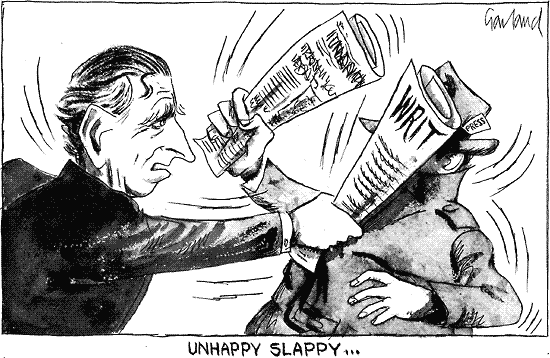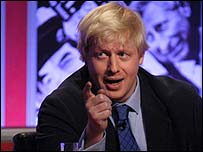HEWITT.MOBI
Thursday, February 23, 2006

Quote of the day
'There will be those who wonder why the Prince of Wales chose to go to court in the first place'
Alastair Campbell
Telegraph Online
Go on Charles: babble, rage and ignore the treacherous toads
(Filed: 23/02/2006)

By Boris Johnson
Do you ever feel, dear readers, that the media are engaged in a gigantic conspiracy against the truth? Have you ever rubbed your eyes, and wondered why they are not making the obvious point? If you have, then the answer is almost always that you have stumbled across a story where the media's own interests are at stake, and when the interests of the press are at stake, the reality of the position is quite irrelevant.
Consider the business of the Prince of Wales and the Mail on Sunday. To judge by the headlines, old Charlieboy has broken off from chatting up his begonias and dropped the most phenomenal clanger. He has said or done something quite preposterous - insulted the Luxembourgers, perhaps, or claimed that marmalade can cure acne. He is being accused of "meddling", of shooting his mouth off, and failing to bite his tongue.
One after another, the self-interested editors of our media organisations line up to accuse him of being a headline seeker. What has prompted this orgy of abuse? Has he said that government ministers should not be driving 6-litre Jaguars? Has he complained about the destruction of the Green Belt? No: it is only when you read the papers quite carefully that you discover that the Prince has not said anything new at all.
On the contrary, it turns out that the Mail has illicitly obtained his private diaries, his private diaries, and has splashed them over several pages, including some quite fruity stuff about the handover of Hong Kong.
Like any other person, the Prince is trying to assert his sovereign and inalienable copyright over his private diaries, and to prevent the paper from publishing any more. In order to defend its conduct the Mail has found some disappointed ex-courtier who has been prepared to describe how, from time to time, the Prince does indeed say things which he knows will make headlines.
I hope it is not prejudicial to the case if I say that I think it an utterly pitiful defence. The diaries were lifted by some secretary, photocopied by the paper, and the Prince should have as much right as anyone else to protection of his private writing; and anything he says in his diaries has a completely different status from anything he says in public. But you won't read much of that in the papers this week, because every editor in the world wants to establish the principle that they can print whatever the hell they want.
So they make a great hoo-ha about the Prince's alleged courting of headlines, as if his occasional decision to say something in public validated their decision to breach his copyright, and they drown out the truth with a chorus of baying "constitutional experts" warning about what the Prince can and cannot say.
"The Prince has gone too far", says the Daily Mail, in an ecstasy of hypocrisy, since its sister paper is determined to publish documents that the Prince would much rather keep private. The bewildered public takes away the impression that the papers want the Prince to shut up, at the same time as wanting the right to make him say more in public. Which is it?
My own view is that the Prince has a perfect right to speak about subjects that interest him and about which he cares; and the whole point about being Prince of Wales is that he can do so and attract headlines, without any real political consequences. He is not a minister. He cannot make laws.
He is a 57-year-old landowner with a not particularly good degree in anthropology who talks to flowers and wants to be reincarnated as a piece of feminine sanitary equipment. By dint of heredity he happens to occupy a unique place in people's loyalties and affections, and if he thinks he can do some good by some pronouncement, I don't see why he shouldn't say more or less anything he pleases.
Under the modern British constitution, he is a peripheral figure. He can rage against modern architecture, but unlike John Prescott he cannot carpet rural England with new developments. He may have his views about GM crops, but he cannot do a thing about the regulations that will call them into being.
He has his views about the advantages of a traditional approach to education, and learning poems off by heart, but he has infinitely less influence on the British educational system than the equally unelected Lord Adonis. He is far less powerful than the meanest minister in Blair's government, and he is of course much less powerful than the editors of the Daily Mail and the Mail on Sunday.
In terms of cosmic influence, it is like comparing the Sun to Pluto.
Indeed, it is a measure of his lack of gravitational pull that this ex-courtier Bolland has so readily decided to betray his boss and say things that he hopes will be obliging to the Mail. And yet it is, of course, this very powerlessness that gives the Prince his value. He is criticised for saying (in his private diary) that the Chinese leadership looked like "appalling old waxworks", and for noting the electric fans they used to keep the flags fluttering. He is attacked for failing to attend the banquet for the Chinese president in 1999, a move he intended to be a snub.
But there is hardly anyone in government who would wish to say anything remotely difficult about China or Tibet - not when Britain and China have such huge and growing interests in common. You can't expect Rupert Murdoch's press to duff up the Chinese, not when he wants to beam his balderdash to a billion satellite viewers.
The Prince can say these things precisely because he is not in charge, and his peculiar position means they will be heard, even if we choose to ignore him. That is why we need him to keep it up.
Go on Charles: you keep firing off those green ink letters to ministers; you keep going with the unfashionable causes; keep babbling away to the herbaceous borders; don't stop caring about Tibet and the Book of Common Prayer; don't worry about the treacherous toads who defect to a self-interested media. The Prince's actions are completely harmless, and sometimes useful.
Can I have my knighthood now?
Boris Johnson is MP for Henley
Charlie
hewitt.mobi Posted at 12:44 am |
0 comments
0 Comments:





